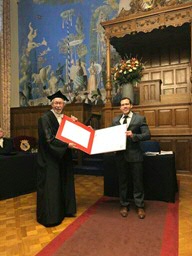Cum laude for PhD student Herib Blanco Reaño

On Friday, December 20 2019, Herib Blanco Reaño successfully defended his PhD thesis entitled Hydrogen potential in the future EU energy system. A multi-sectoral, multi-model approach. He received his doctorate degree 'cum laude'. A big congratulations on behalf of all IVEM colleagues.
Herib conducted his research at the Center for Energy and Environmental Sciences - IVEM of the University of Groningen, the Joint Research Center, part of the European Commission, in Petten and at the International Energy Agenda in Paris, France.
Supervisors:
- Prof. dr. A.P.C. Faaij, Center for Energy and Environmental Sciences.
- Dr. A. Zucker, the Joint Research Center
His research has received funding from the European Union’s Horizon 2020 research and innovation programme under grant agreement 691797 – Store and GO (Innovative large-scale energy STORagE Technologies & Power-to-Gas concepts after Optimization) project.
About his research
Climate change is mainly caused by anthropogenic emissions and can result in loss of biodiversity, population displacement, increased inequality and extreme weather events. To minimize the manifestation of these consequences, changes need to be drastic in the coming decade aiming for a carbon-neutral energy system by mid-century.
This research focuses on hydrogen and how it can contribute to achieving this (close to) zero-emissions system. Hydrogen is currently already used in the industrial sector, but has potential to be safely used for transport, power and buildings. It can also be used to produce synthetic fuels that would enable seamless practices for the end consumers while ensuring a low-carbon production upstream. This research looks at all the energy society consumes assessing the optimal technology mix to achieve the low-carbon future and determines where is hydrogen needed, how much does it cost, what technologies are needed and how uncertainties in technological development translate into systemic changes. Hydrogen is the most attractive for heavy-duty long-haul transport applications, industrial use (steel) and production of synthetic oil for aviation and chemical industry. Hydrogen could also be used in cars as complement of electricity or long-term energy storage. Hydrogen will enable to achieve a low-carbon system while contributing to minimum increase in energy prices or the total cost that society needs to pay (through for example carbon tax). Currently hydrogen production and use remain costly and needs public support such as in the form of financing to achieve the scale needed to achieve these low costs.
More information
More news
-
15 September 2025
Successful visit to the UG by Rector of Institut Teknologi Bandung
